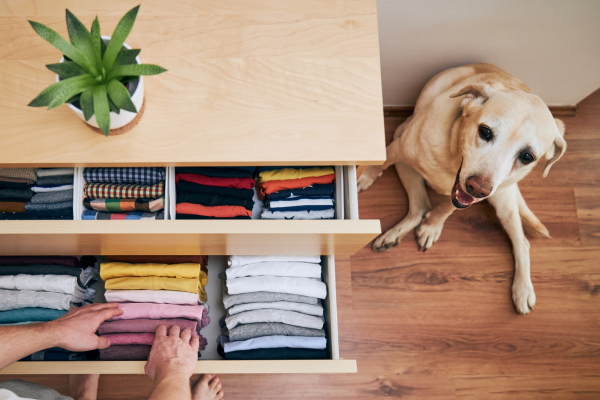Unlock Mental Clarity and Emotional Well-Being: The Power of Organizing One Drawer at a Time

I am a person specialized in minimalism, with a background…
You might be wondering, what does a drawer have to do with my mental health? This writer must be crazy, but I’ll prove that I’m not, for the benefit of all. Did you know that your home is a reflection of your emotional states? Think about those days when you wake up feeling unmotivated, useless, and just wanting to stay in bed. Take a look around. How is the environment you live in? Is it organized? Is there dirty dishes in the sink for days, food packaging left on the table or near the sofa? Are your clothes put away, or is that old armchair you bought hoping to sit and read a book now buried under a pile of clothes, and you don’t even know its color anymore? Are there shoes on the floor or dirty coffee mugs scattered all over the house? And how about your drawers, can you still close them and find what you need inside them easily? All these questions are for you to reflect on how your emotional state is. Drawers are just an analogy; we could use your bag, your car, or your work desk.
When our mind is cluttered with things to solve, we can’t focus on anything. Everything becomes messy, we can’t be consistent in the tasks we start because nothing is organized, and we don’t have clarity on what we need to do. We already feel tired and unmotivated before we even begin anything.
There is a Solution for This!
Yes, and it’s not magic! Try starting by organizing one drawer a day. You have no idea how many unnecessary things you will find in them, things that no longer make sense to keep, only taking up space in your drawer and your mind. Start by getting rid of these items, and then organize the remaining ones. You will notice that as you remove things from the drawer, your mind also starts to organize itself, begins to flow, and you feel more relieved. Certain problems that seemed unsolvable will start to have solutions, or you will know how to seek help.
Take Your Time
The most important thing is to do things at your own pace. Do not set unattainable goals like tidying up your entire room in one day. Start with small details, one step at a time, so you feel motivated to continue and don’t get frustrated by not achieving the planned result. Be gentle with yourself, be an imperfect person in evolution!
The Connection Between Disorder and Mental Health
Disorder in your living space can have a profound impact on your mental health. It’s not just about aesthetics; it’s about creating an environment that supports mental clarity and emotional well-being. When your surroundings are cluttered, it can lead to feelings of anxiety and stress. A messy environment is a constant reminder of tasks undone, creating a sense of overwhelm and helplessness. On the other hand, a clean and organized space can foster a sense of control and calm.
How to Start Organizing
Begin with a Single Drawer: Start small to avoid feeling overwhelmed. Choose one drawer and dedicate a few minutes to sorting through its contents. Discard items you no longer need, and organize the rest in a way that makes sense to you.
Set Realistic Goals: Don’t aim to declutter your entire home in one day. Set small, manageable goals. For instance, you could decide to organize one drawer or one section of a room each day.
Create a Decluttering Schedule: Consistency is key. Set aside time each day or week for decluttering. This helps build a habit and makes the task less daunting.
Use Organizational Tools: Utilize drawer dividers, baskets, and labels to keep items organized. These tools can help maintain order and make it easier to find things.
Prioritize and Categorize: Sort items into categories such as keep, donate, and discard. This helps streamline the decision-making process and reduces clutter more effectively.
The Psychological Benefits of Decluttering
Decluttering has numerous psychological benefits. It can reduce stress and anxiety, improve focus, and boost your overall mood. When your space is tidy, it can be easier to relax and unwind. The act of organizing can also be meditative, giving you a break from the constant stream of thoughts and worries.
Reduces Stress: A cluttered environment can be a significant source of stress. Decluttering can create a more serene and orderly space, helping to reduce stress levels.
Enhances Focus: An organized space can enhance your ability to focus on tasks. When your surroundings are tidy, you’re less likely to be distracted by visual clutter.
Boosts Mood: There is a sense of accomplishment that comes with organizing your space. This can lead to improved mood and increased motivation.
Promotes Better Sleep: A clean and organized bedroom can promote better sleep. When your space is free of clutter, it can create a more peaceful and restful environment.
Practical Tips for Maintaining Organization
Daily Maintenance: Spend a few minutes each day tidying up. This can prevent clutter from accumulating and make your home easier to manage.
Everything Has a Place: Ensure that every item in your home has a designated place. This makes it easier to put things away and maintain order.
Regular Purging: Regularly go through your belongings and get rid of items you no longer need or use. This can prevent clutter from building up over time.
Involve the Whole Family: Make organization a family affair. Involve everyone in the process and assign specific tasks to each family member.
Use the One-In, One-Out Rule: For every new item you bring into your home, get rid of an old one. This can help keep your possessions in check and prevent clutter.
Creating a Routine for a Healthy Mind
Creating and sticking to a routine can significantly impact your mental health and overall well-being. A routine brings structure and predictability to your day, which can be incredibly grounding.
Morning Routine: Start your day with a routine that sets a positive tone. This could include activities such as making your bed, practicing mindfulness or meditation, and planning your day.
Work Routine: Establish a routine for your workday. Set specific times for starting and ending work, taking breaks, and organizing your workspace.
Evening Routine: Wind down at the end of the day with a relaxing routine. This could include tidying up your living space, reflecting on your day, and preparing for the next day.
Self-Care Routine: Make time for self-care activities that nourish your mind and body. This could include exercise, reading, or spending time in nature.
The Importance of Self-Compassion
As you embark on your journey to a more organized life, it’s crucial to practice self-compassion. Understand that perfection is not the goal. There will be days when you feel more motivated and days when you don’t. What’s important is that you keep moving forward, one small step at a time.
Acknowledge Your Efforts: Celebrate the progress you make, no matter how small. Every step towards a more organized life is a victory.
Be Kind to Yourself: Don’t be too hard on yourself if things don’t go as planned. Remember that organizing is a process, and it’s okay to take breaks and reset when needed.
Set Realistic Expectations: Avoid setting unrealistic goals that can lead to frustration. Set achievable goals that you can realistically accomplish.
Seek Support: If you’re feeling overwhelmed, don’t hesitate to seek support from friends, family, or a professional organizer.
The Role of Mindfulness in Organization
Mindfulness can play a significant role in the process of organizing your home. Being mindful means being fully present in the moment and aware of your thoughts and feelings without judgment. This awareness can help you make more conscious decisions about what to keep and what to let go of.
Mindful Decluttering: Approach decluttering with a mindful attitude. Pay attention to your emotional responses to items and make decisions that align with your current needs and values.
Focus on the Process: Rather than rushing through the task, focus on the process of organizing. Notice the sensations, thoughts, and feelings that arise as you go through your belongings.
Practice Gratitude: As you declutter, take a moment to express gratitude for the items that have served you well. This can make it easier to let go of things you no longer need.
Create a Calming Environment: Make your organizing sessions more enjoyable by creating a calming environment. Play soothing music, light a candle, or incorporate aromatherapy.
Long-Term Benefits of a Well-Organized Home
The benefits of maintaining a well-organized home extend beyond the immediate sense of accomplishment. Over time, you’ll notice significant improvements in various aspects of your life.
Increased Productivity: An organized space can lead to increased productivity. When everything is in its place, you can find what you need quickly and focus on your tasks more effectively.
Better Relationships: A tidy home can improve relationships with family members or roommates. It reduces tension and conflicts that arise from clutter and disorganization.
Enhanced Mental Clarity: Living in an organized environment can enhance your mental clarity. It frees up mental space that was previously occupied by clutter and chaos.
Healthier Lifestyle: An organized home can encourage a healthier lifestyle. With a clutter-free kitchen, you’re more likely to cook healthy meals. An organized bedroom can promote better sleep, and a tidy living area can encourage physical activity and relaxation.
Financial Benefits: Keeping your home organized can also have financial benefits. You’re less likely to buy things you already have but couldn’t find, and maintaining your belongings can prolong their lifespan.
In conclusion, the power of a drawer extends far beyond its physical capacity. It’s a reflection of your mental state and a tool for improving your overall well-being. By taking small, manageable steps to organize your space, you can experience profound benefits for your mental health. Remember to take your time, practice self-compassion, and celebrate your progress along the way. An organized home is not just about aesthetics; it’s about creating a supportive environment that nurtures your mind, body, and soul.
What's Your Reaction?
I am a person specialized in minimalism, with a background in behavioral analysis and human development. My passion is to simplify communication and help people focus on what is essential, both personally and professionally. I use my knowledge of human behavior to create content that promotes clarity and purpose, inspiring positive and lasting transformations. I believe that less is more, and my mission is to convey this philosophy through words.



